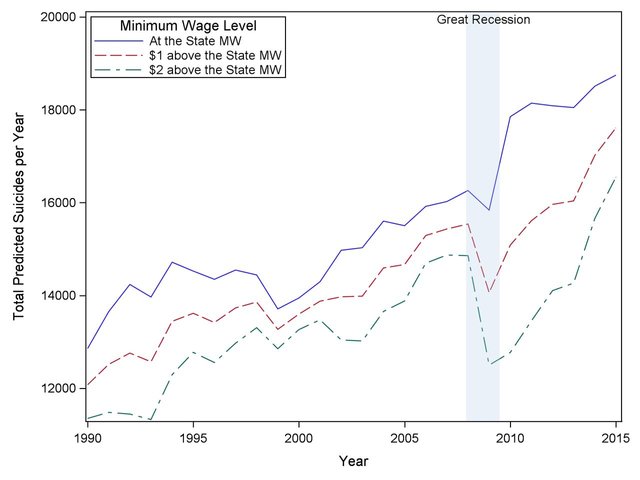Clear connection between minimum wage and suicides in the US

An increase in the state-level minimum wage by 1 dollar is accompanied by a decrease in the number of suicides by 3.5 to 6 percent. This appears from an American long-term study in the British Medical Journal.

In the US, suicides account for nearly one-fifth (!) of deaths between the ages of 18 and 24. In more than half of US states, the number of deaths increased by more than 30 percent between 1999 and 2017.
Previous research had already linked the risk of suicide to financial stress factors, but less was known about the impact of economic interventions, such as an increase in the minimum wage.
To find out more about that, researchers at Emory University in Atlanta compared different US states with regard to minimum wages and suicide rates among Americans between the ages of 18 and 64, from 1990 to 2015.
Lower educated
Between 1990 and 2015, 399,206 lower-educated Americans took their lives, compared to 140,176 Americans who had at least a college diploma. The researchers compared that data with the total of 478 minimum wage changes over that same period in the different states.

Total predicted suicides among US adults aged 18–64 years with a high school education or less at different minimum wage levels over time and varying unemployment rates.
They conclude from this that any increase in the minimum wage by 1 dollar is accompanied by a decrease of 3.5 to 6 percent in the number of suicides among lower educated Americans. The effect was not measurable with higher educated Americans. The link was particularly strong during periods of high unemployment.
Based on that correlation, the researchers estimate that an increase in the minimum wage during the economic crisis after 2008 could have prevented many suicides. An increase of 1 dollar in the period between 2009 and 2015 could have prevented an estimated 13,800 suicides. An increase with 2 dollars even 25,900 cases.
Our findings are consistent with the notion that policies designed to improve the livelihoods of individuals with less education, who are more likely to work at lower wages and at higher risk for adverse mental health outcomes, can reduce the suicide risk in this group.
Our findings also suggest that the potential protective effects of a higher minimum wage are more important during times of high unemployment. While the minimum wage can serve as a population health intervention, it is important for society to provide other buffers between financial status and health, so that low education and economic insecurity do not increase the risk of mental illness and death.

Link to the study: Effects of increased minimum wages by unemployment rate on suicide in the USA
First photo by Eva Blue on Unsplash